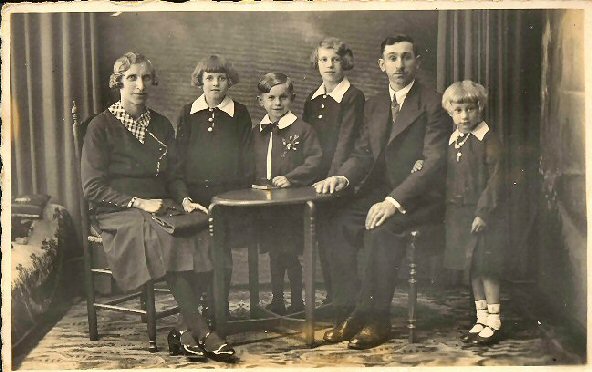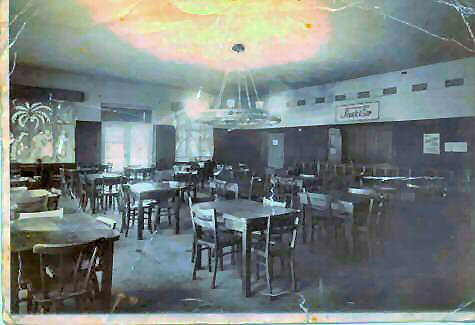On this page is a short story, in very condensed
form, that has connections with the 601st and Rothwesten. It is a heart-rending
account of a very young girl's capture and enslavement by the Nazis during
World War II. The author, Denise Raney, is working on a book, titled Someday
a Blessing, of the life of her mother who is the subject of this story.
Some photos belonging to Denise can be seen at the end of the story.
Someday a Blessing
Sophie Suzana was born April 2, 1925 to Frank and Veronica Stanski in Poznan, Poland. In the early morning of September 1, 1939 at 4:45 a.m., Sophie's family was awakened to find themselves at war. The town’s sirens wailed as bombers roared overhead. Soon came the tanks and soldiers
As time passed, their homes were ransacked, businesses destroyed, valuable's taken, loved ones imprisoned or killed. The people of Poznan had lost their identity. The street signs were renamed and changed to the German language. German soldiers policed the streets now. Jews were rounded up and put into fenced ghettos.
As months passed, Sophie and her family tried to rebuild their lives. Her family had made it without a loss to their immediate family. The war had advanced to other countries. The bombings had stopped, raids were seldom. Stores reopened as the Germans shipped their goods in and controlled Poland’s industrial resources. Concerning all items bought or sold, the Germans would say: “What you do not receive you must steal.”
In late April of 1940 Sophie and her girlfriend strolled down the street unaware of plans by the Germans to raid the streets of Poznan once again for the purpose of capturing 500 boys and 500 girls between the ages of twelve to sixteen.
As a huge truck hurled from around the corner, two German soldiers baled out. With machine guns pointed at her chest, the Nazis yelled and prodded her ribs with the ends of their guns, grabbing her by the shoulders and shoving her into the back of the truck. Breathless and with heart pounding, she knew not to resist, they had no reason not to shoot her. Her mind raced with the worst of thoughts, so many stories she had heard.
This was Sophie’s longest hour as she sat huddled with other crying children and seeing the two German soldiers showing no sign of compassion for them. They only sat with the butts of their guns propped up on their laps.
After several hours, the truck stopped along a country road and they were led into some buildings. Here they had to wait, with the absence of any sort of conveniences, until the Germans had their thousand captives.
Early in the morning they were forced again into the trucks. Being sickened from hunger and fear, the short drive seemed forever. Soon they were unloaded from the trucks and forced to walk a short distance to a railway station. Now railroad box cars would be their mode of travel. There was standing room only and only a trickle of sunlight managed to enter through some cracks. The Nazis did provide one convenience this time. Buckets had been placed in the corners for use as toilets.
For two days they stood or kneeled at best, eventually arriving at Auschwitz, the infamous Nazi death camp. Here they were taken off the train and were given their first meal in days, a small cup of soup, and a piece of bread. They drank the soup, potato skins and all. They put the bread in their pockets, or hid it in their clothing.
They were then made to walk up a small red clay hill. An effort made much more difficult by a drizzling rain and weakened bodies. Some of the children were fainting. Some lay down refusing to continue the walk, only to be hit by the butts of the Germans’ guns.
As Sophie came to the top of the hill, she saw a line of barracks, surrounded by high barbed wire fences. Germans stood guard at every corner, every gate. They patrolled the many fences with german shepherd dogs by their sides. Behind the fences stood thousands of men, dressed in striped gowns, their faces gaunt from hunger, hands clasped on the fences as they would watch another, but different kind of prisoner being lead into camp Auschwitz. Her soul froze when she realized that there was no escape from such a fortress.
The next day at camp Auschwitz, all of the thousand children were split up and sent on different trains to various places in Germany. Again Sophie found herself inside a box car with no accommodations. What was ahead? Her mind gone, the fear of the unknown had taken its toll. Would she be killed? When? How? Tired and weary, she no longer could think, or even care. Hours passed and she arrived eventually in Hamburg, Germany. Sophie was escorted to a large building and made to sit in a circle with several hundred children. German farmers and factory workers nonchalantly walked in front of them, picking out their free laborers.
Sophie was picked out by a small German man, and was instructed to walk aside him as he rode his bicycle. It was a good mile and gave Sophie time to think, and she decided to disobey the German’s demands of her. She refused to eat, or do the chores they tried to show her. Sophie lay on the kitchen floor of the farmer’s house, curled and sobbed uncontrollably. She no longer cared, and if she could not go home she would rather die.
After three days she was removed from the farm. She was examined by a doctor and diagnosed as being homesick. She thought now they would send her home. However she soon found herself back at the same building in Hamburg, in another room, in another circle. But this time they told her sternly she would not return home, “ever, so you must accept it.” She was then put on a passenger train and was attended by an older German lady. Sophie went with her willingly, across Germany to a farm in Hann Munden. She remembers the name Letzer Heller scrolled in big white letters across the front of a large stone farmhouse
On entering the house she was shown an unheated wing at the back of the house, and up some stairs to her bedroom. Soon she was motioned to come back down stairs. On the floor lay six pairs of shoes. Sophie was given shoe polish and rags. This was her first job, and many more would follow.
Sophie accepted her circumstances, and was soon allowed to write home. Answering, her mother said “Be a good girl and do what they say.” Sophie did just that. Being only five feet, four inches tall and weighing eighty pounds, Sophie would find herself for the next five years milking six cows twice a day. Her wrists would swell and would ache with pain, only to be wrapped with rags and sent off to the fields. Beets and clover would be harvested, the barn walls scrubbed and cleaned, cobble stone porches and steps swept, cakes and pies made and baked from scratch every Saturday. She would watch the children and clean house. Sophie's days were long and hard. She ate alone in the kitchen and slept in a cold dark room.
One day in 1945, bombs were falling again. The family took shelter in the cellar. Sophie found herself in the cellar with the family, along with others who happened to be in the area at the time. American forces were known to be approaching also. Finally the bombing stopped. All were fearful of leaving the cellar, not knowing what was to await them. Fear was spread by speculation by some that the door might be opened and hand grenades tossed inside.
Finally, after the sounds of war above quieted, the door to the cellar opened. Speaking in German, a tall well dressed officer leaned down the dark tunnel, motioning with his hands, calling out, “Come out, come out. You will not be hurt.” Sophie followed behind the German family as they began to crawl up the steps of the cellar. Sophie asked the soldier, who are all these people? The officer said, “We are the Americans.” Sophie raised her head, catching her breath, she saw the soldiers everywhere, twigs in their helmets, camouflaged faces, dust covered greens. Sophie said “You are my angels” as she kneeled and kissed his feet.
As they asked each of their nationalities, nineteen year-old Sophie was escorted back to the farm house by two American soldiers who stayed with her to make sure that she would be fed and cared for, and never asked to do any work again by the German family, until she could return home.
Sophie slept and ate to her hearts content, never having to work again as a slave. She was able to contact her parents after the war, but the Iron Curtain kept them apart. Months later Sophie went to work at an American base located at Rothwesten, Germany. Sophie fell in love with an American soldier, and married and came to the States in 1948, but her hardships were far from over, as Someday A Blessing continues. It will be in print sometime this year.
Sophie Suzana Stanski at the age of 14,
shortly before she was captured
![]()

The Stanski family
Poznan, Poland 1933
From left:
mother Veronica
Sophie
Zennon
Stasia
father Frank
Krystna
![]()

Newly married couple Sophie and Charles Raney standing in front of the farm house where she had labored for so long.

This is a photo Sophie had saved. We were unsure of where it was taken, but it appears that the sign on the wall on the right reads Stork Club. I remember the name, but unsure of where it was. I am now leaning toward the Glashaus as the answer. Does anybody know?
Denise is excited over the possibility that one or more of our viewers who were there during this period might recognize either of her parents and contact her. Her husband, Charles O. Raney is at left, next Sophie (disappointed about her face being blurred in this picture), and two unidentified airmen.
Charles Raney
Contact Denise Raney if you have any information of the area or of the people involved that might add to the interest of her upcoming book.
By the way,Denise's mother is still living.
Update...Sophie passed away on October 31st, 2007. According to Denise, she got to see her book in print.
The book can be found at most book stores. Search for "Someday A Blessing".